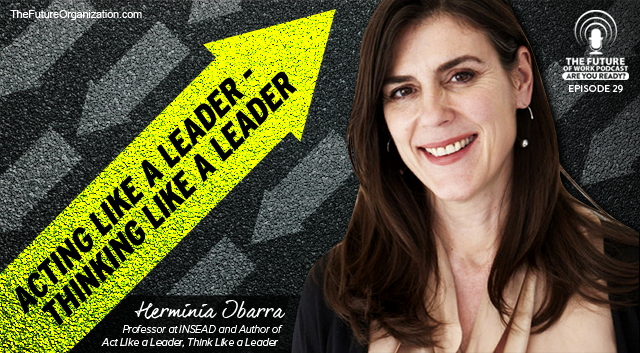Thestrategist.media – 20 April 2015 - Jacob Morgan, a contributor of Forbes, writes that only thirteen percent of employees at a job are occupied with their responsibilities while the organisations are obliviously getting into something that is very poor in efficiency.
According to Morgan, the people who are at the helm of an organisation, endowed with a certain position of power, are at the root cause of many challenges that come on the way of the said organisation. It is an effect of attributing the power to “wrong people” and putting them “at the top”, irrespective of whether they assume the role of a manager or fit into the role of a leader.
Morgan, in his “latest episode of the Future of Work Podcast”, continues to explore the realm of leadership along with a professor of INSEAD ‘School of Business’, Herminia Ibarra. In fact, Ibarra has just published her new book named: “Act Like a Leader, Think Like a Leader”.
One can pretty much guess from the name, says Morgan, that the content of the said book is “a bit counter-intuitive”. In the digital file available on the net, the authors speak about “how people can actually become leaders” wherein Morgan includes Herminia’s views on the ideas of leadership versus management. The said book also touches upon the importance of going out of one’s comfort-zone, to dare something more along with the issues dealing with “employee engagement” and authenticity. In fact, it is equally important to build proper communication channels within the organisation itself.
As per amazon.com, people often aspire to create a positive impact in the world as a successful leader but most of us are mostly caught up in catering to the “demands” of today. Consequently, we let “old mind-sets get in the way” and keep ourselves busy in solving immediate problems instead of taking some time out of the daily schedule to devote in building the skills of leadership.
INSEAD is a “leading international business school” wherein Professor Herminia Ibarra, as an expert of “professional leadership and development”, talks about “how managers and executives” from any levels, by introducing minor yet crucial changes in their work approach, in themselves and in their network, can become a figure of leadership.
Ibarra’s “Act Like a Leader, Think Like a Leader” advices on:
According to Morgan, the people who are at the helm of an organisation, endowed with a certain position of power, are at the root cause of many challenges that come on the way of the said organisation. It is an effect of attributing the power to “wrong people” and putting them “at the top”, irrespective of whether they assume the role of a manager or fit into the role of a leader.
Morgan, in his “latest episode of the Future of Work Podcast”, continues to explore the realm of leadership along with a professor of INSEAD ‘School of Business’, Herminia Ibarra. In fact, Ibarra has just published her new book named: “Act Like a Leader, Think Like a Leader”.
One can pretty much guess from the name, says Morgan, that the content of the said book is “a bit counter-intuitive”. In the digital file available on the net, the authors speak about “how people can actually become leaders” wherein Morgan includes Herminia’s views on the ideas of leadership versus management. The said book also touches upon the importance of going out of one’s comfort-zone, to dare something more along with the issues dealing with “employee engagement” and authenticity. In fact, it is equally important to build proper communication channels within the organisation itself.
As per amazon.com, people often aspire to create a positive impact in the world as a successful leader but most of us are mostly caught up in catering to the “demands” of today. Consequently, we let “old mind-sets get in the way” and keep ourselves busy in solving immediate problems instead of taking some time out of the daily schedule to devote in building the skills of leadership.
INSEAD is a “leading international business school” wherein Professor Herminia Ibarra, as an expert of “professional leadership and development”, talks about “how managers and executives” from any levels, by introducing minor yet crucial changes in their work approach, in themselves and in their network, can become a figure of leadership.
Ibarra’s “Act Like a Leader, Think Like a Leader” advices on:
“• Redefine your job in order to make more strategic contributions
• Diversify your network so that you connect to, and learn from, a bigger range of stakeholders
• Become more playful with your self-concept, allowing your familiar—and possibly outdated—leadership style to evolve”
In Ibarra’s concept the philosophy of “think first and then act” goes topsy-turvy, she gives priority to learning “through action” which will help develop an “external perspective”. Focusing more on the “outsight”, instead of “insight”, will change one’s lookout towards importance of work, time management and corporate relationships.
Describing Ibarra’s book, Amazon writes that it is:
“Packed with self-assessments and practical advice to help define your most pressing leadership challenges, this book will help you devise a plan of action to become a better leader and move your career to the next level. It’s time to learn by doing.”



















